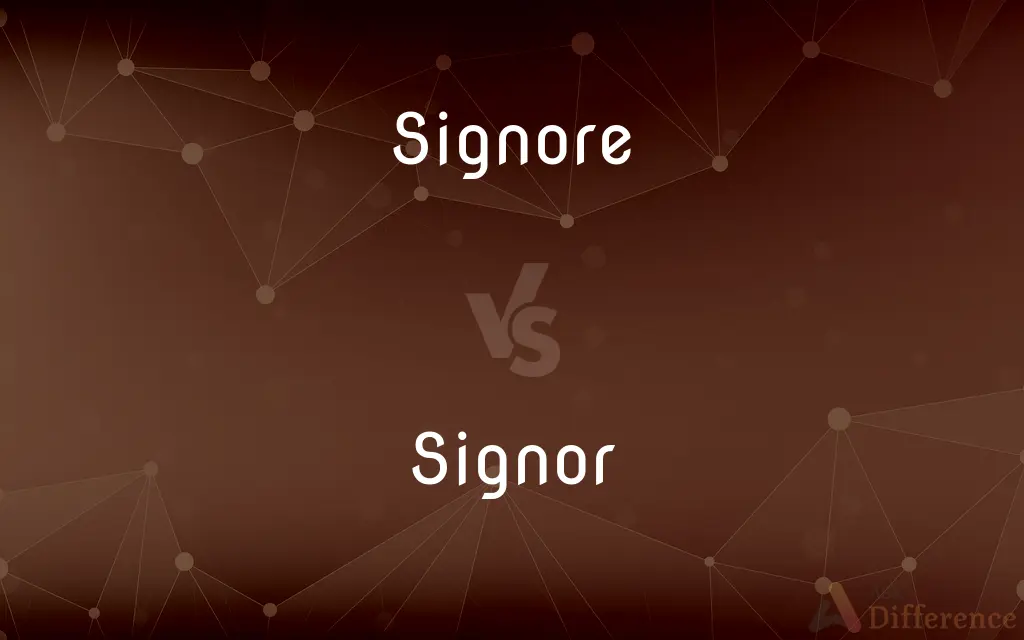Signore vs. Signor — What's the Difference?
By Urooj Arif & Fiza Rafique — Updated on March 19, 2024
"Signore" is the Italian term for "sir" or "mister," used to address or refer to men with respect, while "Signor" is its contracted form, often used before a surname.

Difference Between Signore and Signor
Table of Contents
ADVERTISEMENT
Key Differences
In the Italian language, "Signore" is a polite form of address equivalent to "sir" or "mister" in English, showing respect towards the man being addressed or referred to. It's commonly used in both formal and informal contexts. On the other hand, "Signor" is a contraction of "Signore," typically used in more formal settings, especially in written form, and is often followed by the person's last name.
While "Signore" can stand alone as a term of address in a conversation, "Signor" is almost always used in conjunction with a surname. For example, "Signore" might be used to get a man's attention in a respectful manner, whereas "Signor Rossi" would be used to specifically refer to Mr. Rossi in a formal context.
The choice between "Signore" and "Signor" can also reflect the level of formality or familiarity in a relationship. "Signore" may be used in a slightly more casual or general context, while "Signor" precedes a surname to formally address or mention someone, adding a layer of respect through specificity.
The use of "Signore" and "Signor" extends beyond simple address and reflects Italian customs of courtesy and respect. In formal written communication, such as letters or official documents, "Signor" followed by the surname is the standard form of address.
Both forms are essential in understanding Italian etiquette, particularly in professional or formal social interactions, where proper address is key. However, the choice between them largely depends on the situation and the desired level of formality.
ADVERTISEMENT
Comparison Chart
Usage
General term of respect, equivalent to "sir" or "mister"
Contracted form, often used with a surname
Context
Both formal and informal
Primarily formal
Accompanied By
Can stand alone
Almost always followed by a surname
Formality
Can be used in slightly more casual contexts
Indicates a higher level of formality
Application
Used in conversation and address
Used in formal writing and when specifically referring
Compare with Definitions
Signore
A term of respect for men, equivalent to sir.
Buongiorno, Signore!
Signor
Indicates formal respect, especially in written communication.
Dear Signor Bianchi,
Signore
Reflects courtesy in Italian culture.
Signore, after you.
Signor
Precedes surnames in formal contexts.
Signor Verdi will be speaking next.
Signore
Used to address men in a polite manner.
Signore, your table is ready.
Signor
Used in official or formal settings.
Please welcome, Signor Martini.
Signore
Can be used both formally and informally.
Could you help me, Signore?
Signor
Emphasizes specificity and respect.
Signor Presidente, a moment of your time?
Signore
Stands alone without needing a surname.
Excuse me, Signore?
Signor
Contracted form of Signore, used before a surname.
Signor Rossi, your car is waiting.
Signore
Pl. si·gno·ri (-yôrē, -yōrē) Abbr. Sig. or S. Used as a form of polite address for a man in an Italian-speaking area.
Signor
A title or form of address used of or to an Italian-speaking man, corresponding to Mr or sir
Signor Ugolotti
I am a man of honour, Signor
Signore
A plural of signora.
Signor
Used as a courtesy title for a man in an Italian-speaking area, equivalent to Mr.
Signore
Alternative form of signor
Signor
A courtesy title for a man of Italian origin.
Signore
An Italian title of respect for a man; equivalent to the English `sir'; used separately (not prefixed to his name)
Signor
Sir; Mr.; - a title of address or respect among the Italians. Before a noun the form is Signor.
Signor
Used as an Italian courtesy title; can be prefixed to the name or used separately
Common Curiosities
Is "Signor" used in spoken or written Italian?
"Signor" is used in both, but it is especially common in formal written communications.
When should I use "Signore"?
"Signore" can be used in both formal and informal settings to address or refer to men respectfully.
How do I decide between using "Signore" and "Signor"?
The choice depends on the level of formality and whether you are addressing someone directly or referring to them by name.
What is the difference between "Signore" and "Signor"?
"Signore" is a general term of respect, while "Signor" is a contraction used before surnames in formal contexts.
How does using "Signore" or "Signor" reflect Italian culture?
Both terms reflect the importance of courtesy and formality in Italian social interactions.
What is the significance of addressing someone as "Signor" in Italy?
It signifies respect and formality, especially in professional or official contexts.
Can women be addressed as "Signore" or "Signor"?
No, women are addressed as "Signora" for married or older women and "Signorina" for younger or unmarried women.
Is it appropriate to use "Signore" in a business setting?
Yes, "Signore" can be used respectfully in business settings, though "Signor" followed by a surname is more formal.
Can "Signor" be used without a surname?
Typically, "Signor" is followed by a surname, emphasizing formality and respect in addressing someone.
Does the use of "Signor" before a surname imply a higher social status?
Not necessarily higher social status, but it does convey a level of respect and formality.
Can "Signore" be used to address a group of men?
Yes, "Signore" can be used to address a group of men in a respectful manner.
How has the use of "Signore" and "Signor" evolved in modern Italian?
The usage remains relatively stable, reflecting enduring values of respect and courtesy in Italian society.
Are there regional variations in the use of "Signore" and "Signor"?
Usage is consistent across Italy, though individual preferences and contexts may influence the choice.
What is the impact of incorrectly using "Signore" or "Signor"?
Incorrect use may cause confusion or appear disrespectful, underscoring the importance of understanding their proper application.
Is it ever incorrect to use "Signore"?
It might be less appropriate in very formal contexts where "Signor" followed by the surname is expected.
Share Your Discovery

Previous Comparison
Reach vs. Hit
Next Comparison
Knight vs. PrinceAuthor Spotlight
Written by
Urooj ArifUrooj is a skilled content writer at Ask Difference, known for her exceptional ability to simplify complex topics into engaging and informative content. With a passion for research and a flair for clear, concise writing, she consistently delivers articles that resonate with our diverse audience.
Co-written by
Fiza RafiqueFiza Rafique is a skilled content writer at AskDifference.com, where she meticulously refines and enhances written pieces. Drawing from her vast editorial expertise, Fiza ensures clarity, accuracy, and precision in every article. Passionate about language, she continually seeks to elevate the quality of content for readers worldwide.
















































